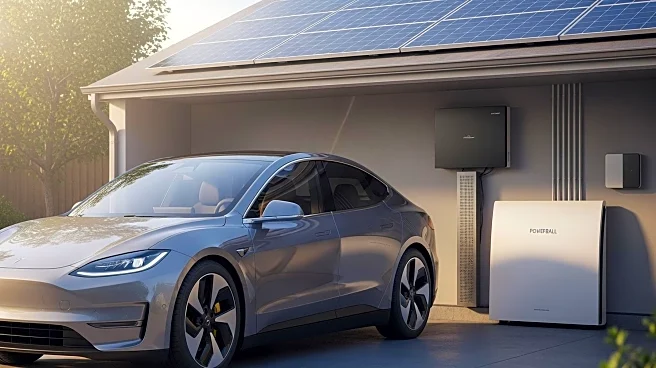What's Happening?
A Tesla driver has surprised many by revealing a remarkably low electricity bill for charging their electric vehicle over the past year. The driver managed to keep costs down to just $2.37 by utilizing solar panels and a Tesla Powerwall, a rechargeable
lithium-ion battery that stores energy from solar or the electricity grid. This approach highlights the potential for significant savings on energy costs for electric vehicle owners who invest in renewable energy solutions. The Powerwall, which starts at around £5,000, allows users to store energy for later use, providing both energy security and financial benefits. The cost of running an electric vehicle can vary significantly depending on the make and model, as well as the charging method used.
Why It's Important?
This development underscores the potential for renewable energy solutions to reduce the operational costs of electric vehicles, making them more accessible and affordable in the long term. As more consumers consider transitioning to electric vehicles, the ability to minimize charging costs through solar energy and battery storage could drive wider adoption. This shift could have significant implications for the energy market, reducing reliance on traditional fuel sources and promoting sustainable energy practices. Additionally, the financial benefits of using solar power and energy storage systems like the Tesla Powerwall could encourage more homeowners to invest in renewable energy technologies, contributing to broader environmental and economic benefits.
What's Next?
As the adoption of electric vehicles continues to grow, more consumers may explore renewable energy solutions to manage their energy costs effectively. The market for solar panels and energy storage systems like the Tesla Powerwall is likely to expand, driven by increasing demand for sustainable and cost-effective energy solutions. Policymakers and energy companies may also play a role in facilitating this transition by offering incentives or subsidies for renewable energy investments. The continued development and innovation in energy storage technology could further enhance the efficiency and affordability of electric vehicle charging, supporting the broader shift towards a more sustainable energy future.
Beyond the Headlines
The integration of renewable energy solutions with electric vehicles represents a significant cultural and technological shift towards sustainability. This trend not only addresses environmental concerns but also reflects changing consumer preferences and priorities. As more individuals and businesses prioritize sustainability, the demand for innovative energy solutions is likely to increase, driving further advancements in technology and infrastructure. This shift could also influence public policy and regulatory frameworks, as governments seek to support and accelerate the transition to a low-carbon economy.















